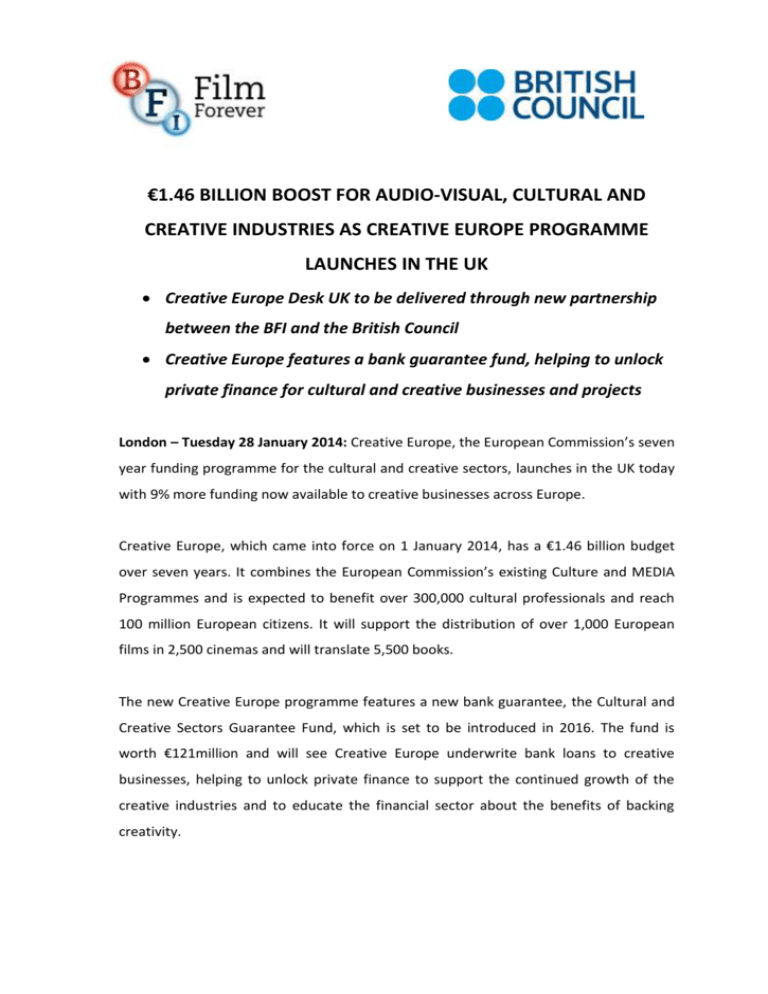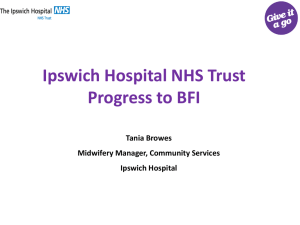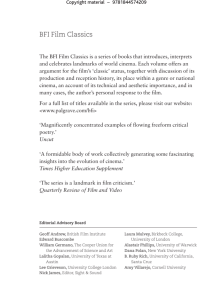PR - Creative Europe Desk UK Launch
advertisement

€1.46 BILLION BOOST FOR AUDIO-VISUAL, CULTURAL AND CREATIVE INDUSTRIES AS CREATIVE EUROPE PROGRAMME LAUNCHES IN THE UK Creative Europe Desk UK to be delivered through new partnership between the BFI and the British Council Creative Europe features a bank guarantee fund, helping to unlock private finance for cultural and creative businesses and projects London – Tuesday 28 January 2014: Creative Europe, the European Commission’s seven year funding programme for the cultural and creative sectors, launches in the UK today with 9% more funding now available to creative businesses across Europe. Creative Europe, which came into force on 1 January 2014, has a €1.46 billion budget over seven years. It combines the European Commission’s existing Culture and MEDIA Programmes and is expected to benefit over 300,000 cultural professionals and reach 100 million European citizens. It will support the distribution of over 1,000 European films in 2,500 cinemas and will translate 5,500 books. The new Creative Europe programme features a new bank guarantee, the Cultural and Creative Sectors Guarantee Fund, which is set to be introduced in 2016. The fund is worth €121million and will see Creative Europe underwrite bank loans to creative businesses, helping to unlock private finance to support the continued growth of the creative industries and to educate the financial sector about the benefits of backing creativity. Creative Europe will be delivered in the UK through a wide-ranging new partnership between the BFI and the British Council. Creative Europe Desk UK is a new information and advice service to promote Creative Europe in the UK, replacing the former MEDIA Desk UK and Antennae and the UK Cultural Contact Point. Creative Europe Desk UK, under the joint leadership of the BFI and British Council, brings together partners from across the UK including Arts Council England, Arts Council Northern Ireland, Northern Ireland Screen, Creative Scotland and Arts Council Wales and the Welsh Government, and will see the establishment of a dedicated information office in each of the UK’s nations, and in one of the English regions outside of London. The UK audio-visual industries benefitted from funding worth just over €100m through the MEDIA programme which ran until 2013. Around €50m supported UK companies directly, including production companies (Ruby Films, Sixteen Films, Recorded Picture Company and many others), distributors, cinemas, training courses, markets and festivals. The other €50m supported the cinema releases of British films across Europe, with examples including €1.5 million for The Iron Lady, €1.3 million for Slumdog Millionaire and €1 million for The King’s Speech. For the Culture Programme 273 UK organisations were involved in 344 projects receiving almost €128 million in total. Recipients include the Take Five Europe scheme to develop the international careers of emerging jazz musicians – led by Serious Events in the UK, with partners in France, the Netherlands, Norway and Poland. The number of UK organisations participating in projects has increased by 50% since the programme started in 2007. Michel Magnier, Director for Culture and Creativity at the European Commission and Brian Holmes, Interim Director for the European Commission‘s Executive Agency for Education, Audiovisual and Culture (EAEAC), will formally launch Creative Europe at a special event later today to an audience of industry professionals from the UK’s audiovisual, cultural and creative sectors. Michel Magnier, Director for Culture and Creativity at the European Commission, comments: “UK filmmakers, artists and cultural professionals deservedly enjoy recognition from audiences and peers worldwide, and UK cultural organisations are sought-after partners in creative European collaborations - bringing expertise and inspiration, while challenging assumptions and the status quo. The UK’s audio-visual industry brings to Europe a wealth of talent and professionalism, with filmmakers who are cherished across the continent and indeed the world, Mike Leigh, Ken Loach, Stephen Frears, Clio Barnard to mention just a few. I am excited to see how Creative Europe can play its role in supporting these vibrant sectors and help to inspire fruitful partnerships and collaboration with professionals across the rest of Europe, and beyond.” Amanda Nevill, CEO of the BFI, comments: “Supporting and promoting British talent and companies internationally and bringing a diverse range of World and European cinema to British audiences are key priorities for the BFI, and Creative Europe will play an important role in helping us to achieve these aims. The UK is a leader in creativity, and our creative industries are recognised as key engines for economic growth. We’re excited to enter into this new partnership with the British Council to help ensure that entrepreneurial professionals across the UK can access and benefit from support through Creative Europe, to help UK film, culture and creativity continue to thrive.” Graham Sheffield, Director of Arts at the British Council, said: “We are delighted to be partnering with the BFI to lead the delivery of Creative Europe desks for the UK. We share the European Commission’s view that international exchange and collaboration in the arts and the creative industries supports the prosperity of the sector, while promoting understanding between cultures. As well as providing advice and support to organisations in the UK, we will be able to use our global network of offices to help broker effective European and international partnerships.” More information about Creative Europe: What is Creative Europe? It opened on 1 January 2014 and will run until 31 December 2020 It replaces previous separate 'Culture' and 'MEDIA' programmes There are a number of funding streams available under Creative Europe that organisations can apply for What are the Creative Europe Desks? To help promote the programme, and support applications, the European Commission funds a Creative Europe Desk service in all member states, including other participating countries This replaces separate MEDIA Desk UK (delivered by the BFI) and Antennae offices in delivered by Creative Scotland and Welsh governments respectively) and Cultural Contact Point (delivered by Visiting Arts) From 1 January 2014, BFI and British Council began delivering an interim service for the audio-visual and culture sectors, on behalf of DCMS, until the formalised BFI/BC partnership commences from 1 April 2014 A BFI / British Council partnership will provide Creative Europe Desks in the UK This will cover delivery in England and Northern Ireland, and also oversee devolved provision in Scotland, Wales and Northern Ireland, providing central co-ordination with the European Commission and services such as a dedicated web site and publications. Other partners include Arts Council England, Arts Council Northern Ireland, Northern Ireland Screen, Creative Scotland and Arts Council Wales and the Welsh Government. The arrangement will come into force from 1 April 2014 – Ends – For media enquiries please contact Emma Hewitt, Head of Press & PR (Interim), BFI emma.hewitt@bfi.org.uk / +44 (0)20 7173 3256/ +44 (0)7584 264 618 Mark Moulding, Senior Press Officer, British Council Mark.Moulding@britishcouncil.org / +44 (0)207 389 4889 NOTES TO EDITORS About the BFI The BFI is the lead body for film in the UK with the ambition to support a flourishing film environment in which innovation, opportunity and creativity can thrive by: Connecting audiences to the widest choice of British and World cinema Preserving and restoring the most significant film collection in the world for today and future generations Championing emerging and world class film makers in the UK - investing in creative, distinctive and entertaining work Promoting British film and talent to the world Growing the next generation of film makers and audiences The BFI is a Government arm’s-length body and distributor of Lottery funds for film. The BFI serves a public role which covers the cultural, creative and economic aspects of film in the UK. It delivers this role: As the UK-wide organisation for film, a charity core funded by Government By providing Lottery and Government funds for film across the UK By working with partners to advance the position of film in the UK. Founded in 1933, the BFI is a registered charity governed by Royal Charter. The BFI Board of Governors is chaired by Greg Dyke. About the British Council The British Council is the UK’s international organisation for educational opportunities and cultural relations. We create international opportunities for the people of the UK and other countries and build trust between them worldwide. We work in more than 100 countries and our 7000 staff – including 2000 teachers – work with thousands of professionals and policy makers and millions of young people every year teaching English, sharing the Arts and in education and society programmes. We are a UK charity governed by Royal Charter. A publically-funded grant-in-aid provides less than a quarter of our turnover which last year was £781m. The rest we earn from English teaching, UK exams and services which customers around the world pay for, through education and development contracts and from partnerships with other institutions, brands and companies. All our work is in pursuit of our charitable purpose and creates prosperity and security for the UK and the countries we work in all around the world. For more information, please visit www.britishcouncil.org. You can also keep in touch with the British Council through http://twitter.com/britishcouncil and http://blog.britishcouncil.org








